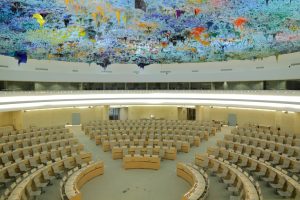Earlier in November, India became one of the first countries to undergo its fourth cycle universal periodic review (UPR) at the United Nations Human Rights Council (UNHRC). India received almost 100 recommendations on human rights concerns that originated from civil society stakeholder reports, like the one we produced with our India Coalition for Minority Rights. Multiple countries, including the United States, Australia, South Korea, Japan, and the United Kingdom particularly raised concerns that directly affect the Indian military’s human rights record. The UPR, while a symbolic process, may point to real concerns that India’s closest security partners may have.
To be clear, it’s hard to take the UNHRC, a forum that includes the world’s worst human rights offenders, seriously, and even more so because the Council has no enforcement mechanisms for human rights. Realistically, the Indian government will ignore recommendations and questions to improve human rights, especially along faith, gender, and caste lines, especially when countries providing critical comments have their own human rights problems. And while India can justifiably point to Iran’s treatment of women when Iran asks India about gender justice for Indian women, India will shrug off Western concerns about human rights as neocolonialism.
For human rights activists in India and abroad, the jarring hypocrisy on display at the U.N. Human Rights Council is just as difficult to swallow. When Pakistan rightfully calls India out for severe human rights violations in Kashmir and notes the institutional persecution of Indian Muslims, it can be hard for Indian human rights activists to shake off the accusations that they are somehow linked to the Pakistani military. Moreover, the messenger, Pakistan, has its own awful history, and when India and Pakistan trade barbs about each other’s records, they both undermine useful solidarity between activists in South Asia fighting the same threats to human rights on both sides of the border.
However, the Indian government may listen to its closest security partners, and despite the practical futility of the UNHRC, the UPR process is still useful for activists trying to find leverage points with foreign governments to raise human rights. This is especially true for human rights activists in the Quad countries – India, Australia, Japan, and the United States. Each of India’s Quad partners highlighted similar concerns, and activists in these countries can urge their governments to incorporate human rights into any further security cooperation in the Quad. Moreover, South Korea, which looks to deepen its own cooperation with the Quad, also raised concerns about India’s human rights record at the UPR.
Japan, South Korea, and the United States asked India to ratify the Convention against Torture and Other Cruel, Inhuman or Degrading Treatment or Punishment. Japan also asked India to ratify the International Convention for the Protection of All Persons from Enforced Disappearance. Since 1958, when India first passed the Armed Forces Special Powers Act (AFSPA), the Indian military has been dogged by allegations of extrajudicial killings, torture and enforced disappearances, which the United States has documented, in Northeast India and Kashmir. Although the United States did not raise concerns about enforced disappearances specifically, it asked India to repeal or revise AFSPA, which allows the Indian military to conduct operations within Indian territory. Australia also asked India to create mechanisms to hold individuals accountable for human rights violations, and no doubt, the Australian government was likely concerned about how security forces perpetuate human rights violations in India.
Notably, this is not the first time, nor certainly the last time, that Quad countries have raised concerns about the current Indian government. Left-leaning Australian politician David Shoebridge, who is now in the governing coalition, has previously called India an unreliable partner, and the Australian Parliament’s Briefing Book raises concerns about the Indian government’s reliability given the current Hindu nationalist government’s authoritarian tendencies.
U.S. Secretary of State Antony Blinken has said, both in appearances with his counterpart, External Affairs Minister S. Jaishankar, and in official State Department events, that he is concerned about human rights in India. And even U.S. President Joe Biden has expressed some concern about the health of India’s democracy.
More than likely, the Indian government will continue to forge deeper security relationships with all the Quad countries, both within the Quad and through bilateral cooperation. But clearly India’s security partners are concerned. And, despite the enduring fallacy that governments must choose between human rights and national security, India’s security partners can pursue deeper cooperation without losing sight of human rights.
In Australia and the United States, lawmakers can use targeted human rights sanctions regimes to ensure security forces guilty of human rights violations cannot access Australian and U.S. weapons through lucrative defense contracts. In the past, the United States has used Global Magnitsky sanctions against Bangladeshi security partners. The United States also has the Leahy Law, which prevents Washington from providing security assistance to partners who have committed human rights violations. The United States has invoked this law to prevent U.S. tax dollars from flowing to security partners in Cameroon, Colombia, and Saudi Arabia.
India needs the Quad to help contain Chinese aggression on its northeastern border. Given this reality, lawmakers in Tokyo, Canberra, Washington, and even Seoul should not shy away from pushing New Delhi to uphold its commitment to human rights. Certainly, as India’s UPR demonstrated, Japanese, Australian, American, and Korean diplomats may have the appetite to push India on its human rights. The only question, now, is if Quad governments will follow through outside the U.N. Human Rights Council. Certainly, they should embrace the opportunity to elevate human rights as they engage more deeply in this security alliance.

































